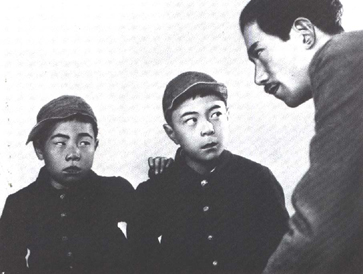

Released: 1932
Length: 90 minutes
Producer: Shochiku/Kameta
Director: Yasujiro Ozu
Screenplay: Akira Fushimi, Geibei Ibushiya,
& Ozu [aka "James Maki"]
Cinematographer: Hideo Shigehara
Sound: Originally a silent film performed
with benshi.
Cast:
The Father.........................................................................................Tatsu Saito
Elder Son..................................................................................Hideo Sugawara
Younger Son...................................................................................Tokkan Kozo
The Mother.........................................................................Mitsuko Yoshikawa
Story:
A typical Tokyo office worker lives in a typical suburban
house with a typical wife and their two sons (8 and 10 years old). The
boys are struggling to form their identities and are horrified when they
see their father bowing and cringing to his boss , even playing the fool
in a home movie. They love their father and rebel against his self-deprecation,
demanding that he become the boss. Not understanding how unlikely
this is, they act out by getting into fights, becoming truants, and staging
a hunger strike. In the end, they come to understand their family's (and
their own) place in Japanese society, confirming the father's view that
"this is a problem they will have to live with for the rest of their lives."
Commentary:
I Was Born, Butů was hardly Ozu's first film (he'd directed twenty-three other silent films during the four years before I Was Born, Butů was released), but it is his first great film. It is also the only remaining Ozu film still in circulation, most of the others having been completely lost, even including the scripts.
The film is an excellent example of the Japanese shomin-geki genre, which roughly means "dramas about everyday life," usually among the lower classes. As usual for silent films of this period, it was meant to be shown ("performed") with a benshi, or live narrator. [The use of benshi is a uniquely Japanese film innovation, growing out of the use of narrators in traditional Japanese theatrical forms such as Noh, Kabuki, and Bunraku. For more information, click on the benshi link under "Sound", above.] Of this film, Ozu said,